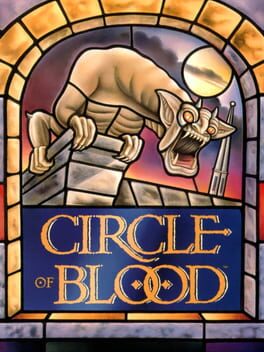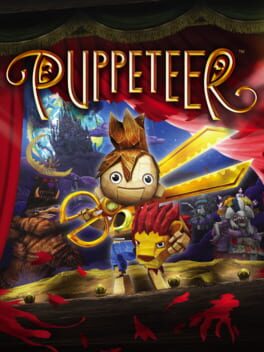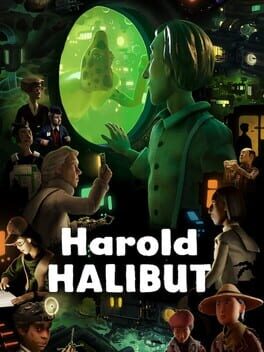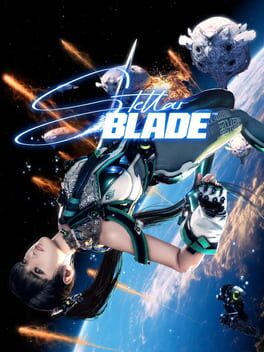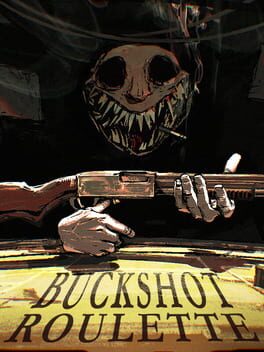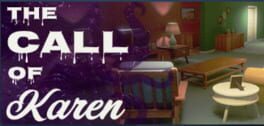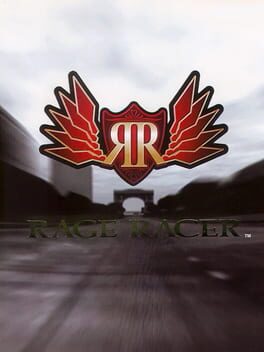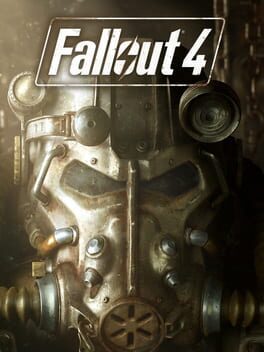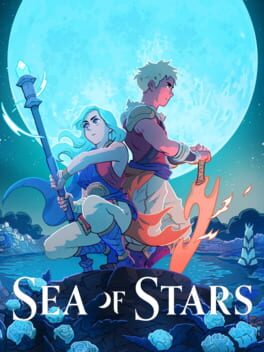Acquiescence
472 Reviews liked by Acquiescence
Circle of Blood
1996
George Stobbart, the only likeable American tourist that has ever set foot in Europe.
If you do not love this game, you do not love life. I have nothing more to say. Truly the bedrock of why I still to this day adore adventure games.
Note* It is an abomination that the 1996 release is not available under its title in most countries 'Broken Sword: Shadow of the Templars'.
If you do not love this game, you do not love life. I have nothing more to say. Truly the bedrock of why I still to this day adore adventure games.
Note* It is an abomination that the 1996 release is not available under its title in most countries 'Broken Sword: Shadow of the Templars'.
Circle of Blood
1996
Circle of Blood
1996
Puppeteer
2013
Harold Halibut
2024
I really, really wanted to enjoy Harold Halibut more than I did. Harold, our protagonist, is a fish out of water: an autistic-coded janitor slash jack-of-all-trades, whose daily grind involves doing various tasks for the mostly warm but slightly stuck up crew of scientists and venture capitalists aboard the marooned spaceship, The Fedora. The game is underwater, so there's the expected Bioshock-esque critique of capitalism run riot, presented with a more dry, wry sense of humor. The game makes a strong first impression, with several mysteries piling up alongside the slow reveal of this artful, beautiful world. I particularly loved how you get around on The Fedora via a salmon cannon that shoots the people from hub to hub (for a nominal fee).
And, c'mon, the art! I know it's not the most technical game running under the hood, but this game is a sight to behold. Each interior is handcrafted and rich with detail, but then digitalized and animated so that the puppetry has no strings. Even though the gameplay is light, I found myself mashing the trigger on the controller to zoom into each interior and soak in as much of the ambiance as I could. The soundtrack, too, is subtle but evocative, fading in and out when the player enters certain locations. Tremendous stuff.
During its introductory moments, I thought this game might be another Night in the Woods-esque narrative game, one that took a story and set it across many days so that you could build relationships and be rewarded for meandering from the main task routes at every turn. And, for a while, it was. I would get invited to dinner by the former pilot, or pore over love letters from decades past with the postman. And each character, lovingly designed and voice acted, always had something to say about life's meaning, or the dulling effect of daily jobs (and the threat of debtor's prison) in an alien, water-logged world.
But my return visits to the various wings of The Fedora yielded less and less surprise, or even change, as the days went on. By midgame, Harold had stumbled upon a seemingly huge reveal, with widespread implications for him, his shipmates--maybe even the human race--yet our daily tasks consisted of slow runs to the pharmacy with almost no diversity of content. It felt like we were being forced to play out an extended montage, a pain that only sharpened once the weeklong scenario ended with a literal montage.
Repetition in videogames is part of the act, of course. It can be gameplay, the ritualistic dance of combat that break up FPS campaigns, or the return trips of roguelites that build repetitiveness into their DNA as a means of player progression. But Harold Halibut seems to say: God, isn't capitalist bureaucracy boring and awful?" Yes, it is. And it's especially boring and awful when it's hammered home in a world as lush and gorgeous as Harold Halibut.
There is a payoff, and the narrative eventually does get going. But the jarring pace and tonal shifts never really go away.
I'm glad this game exists. And it's clear that there's a huge amount of work that's gone into this game and realizing its vision. Unfortunately, Harold Halibut isn't able to successfully navigate the choppy waters separating sincerity and comedy, and ends up splitting the two in a way that challenged me to go on.
In the end, Harold Halibut is way more niche than you might expect. Its messages on capitalism, and humanity's tendency toward resource drain even in the face of calamity, are all vital and integrated well into the story. I just wish the game, like its main character, was a little more self-assured.
And, c'mon, the art! I know it's not the most technical game running under the hood, but this game is a sight to behold. Each interior is handcrafted and rich with detail, but then digitalized and animated so that the puppetry has no strings. Even though the gameplay is light, I found myself mashing the trigger on the controller to zoom into each interior and soak in as much of the ambiance as I could. The soundtrack, too, is subtle but evocative, fading in and out when the player enters certain locations. Tremendous stuff.
During its introductory moments, I thought this game might be another Night in the Woods-esque narrative game, one that took a story and set it across many days so that you could build relationships and be rewarded for meandering from the main task routes at every turn. And, for a while, it was. I would get invited to dinner by the former pilot, or pore over love letters from decades past with the postman. And each character, lovingly designed and voice acted, always had something to say about life's meaning, or the dulling effect of daily jobs (and the threat of debtor's prison) in an alien, water-logged world.
But my return visits to the various wings of The Fedora yielded less and less surprise, or even change, as the days went on. By midgame, Harold had stumbled upon a seemingly huge reveal, with widespread implications for him, his shipmates--maybe even the human race--yet our daily tasks consisted of slow runs to the pharmacy with almost no diversity of content. It felt like we were being forced to play out an extended montage, a pain that only sharpened once the weeklong scenario ended with a literal montage.
Repetition in videogames is part of the act, of course. It can be gameplay, the ritualistic dance of combat that break up FPS campaigns, or the return trips of roguelites that build repetitiveness into their DNA as a means of player progression. But Harold Halibut seems to say: God, isn't capitalist bureaucracy boring and awful?" Yes, it is. And it's especially boring and awful when it's hammered home in a world as lush and gorgeous as Harold Halibut.
There is a payoff, and the narrative eventually does get going. But the jarring pace and tonal shifts never really go away.
I'm glad this game exists. And it's clear that there's a huge amount of work that's gone into this game and realizing its vision. Unfortunately, Harold Halibut isn't able to successfully navigate the choppy waters separating sincerity and comedy, and ends up splitting the two in a way that challenged me to go on.
In the end, Harold Halibut is way more niche than you might expect. Its messages on capitalism, and humanity's tendency toward resource drain even in the face of calamity, are all vital and integrated well into the story. I just wish the game, like its main character, was a little more self-assured.
Stellar Blade
2024
This game is full of SOUL.
+ Stellar art direction
+ Stellar vibes
+ Stellar combat
+ Stellar Bosses
+ Stellar Soundtrack
+ Stellar presentation
+ Stellar performance and optimization
+ Fun dress up game tbh
+ Puzzle Variety
+ Rule of Cool the whole way through
- Fairly mediocre storytelling and characters, but the actual world and story is still cool in concept.
- One of the final boss options is pretty lame compared to the other, its also the only boss in the game that felt slightly buggy. Kinda weird. The other boss is SUUUUPER rad though.
+ Stellar art direction
+ Stellar vibes
+ Stellar combat
+ Stellar Bosses
+ Stellar Soundtrack
+ Stellar presentation
+ Stellar performance and optimization
+ Fun dress up game tbh
+ Puzzle Variety
+ Rule of Cool the whole way through
- Fairly mediocre storytelling and characters, but the actual world and story is still cool in concept.
- One of the final boss options is pretty lame compared to the other, its also the only boss in the game that felt slightly buggy. Kinda weird. The other boss is SUUUUPER rad though.
Buckshot Roulette
2023
The Call of Karen
2020
This is like Jeanne Dielman, 23 Quai du Commerce, 1080 Bruxelles, if Jeanne met Cthulhu at the end.
For how amusing the concept is, no amount of metacommentary about housewife drudgery and repetition can cancel the fact they made an agonizingly repetitive game, even when just half an hour long, and the broken physics and Unreal Engine 4 control glitches do not help. Just one more house chore in the rotation (like laundry) would have done the variety a world of good, while still maintaining the themes unaltered.
Still worth playing for what it is.
For how amusing the concept is, no amount of metacommentary about housewife drudgery and repetition can cancel the fact they made an agonizingly repetitive game, even when just half an hour long, and the broken physics and Unreal Engine 4 control glitches do not help. Just one more house chore in the rotation (like laundry) would have done the variety a world of good, while still maintaining the themes unaltered.
Still worth playing for what it is.
Rage Racer
1996
Sacrifices the outrun "day at the beach" aesthetic of the first 2 games for something going for a bit more grunge, which does not work for it in my opinion. The city you race around in is nice enough, but feels like a step down comparatively. Takes itself a bit too seriously in a way that is not particularly charming.
Final Fantasy VII Rebirth is truly a marvelous achievement, as is the ambitious project it belongs to. The already great cast feels better than ever before and the enormous world is full of unique and fun activities. The story is excellent with many high points, and while the finale is inconclusive, it gives a lot of food for thought regarding the next game. I believe that despite some minor faults, this is the pinnacle of an open-world, character-driven JRPG, and a truly enjoyable game, with a great OST to boot. Even if someone wasn’t a fan of FFVII Remake, I think this game does a very good job addressing some of its issues. It took me around 130 hours to finish the first playthrough and complete its side content. Highly recommended to fans of an action-packed game or an epic story and to those who love mini-games.
The full review can be read here!
The full review can be read here!
Alan Wake II
2023
This is a complicated review to write at the ass-end of a binge of every Remedy game I could lay my hands on. Alan Wake II would have been better as an introduction to the Remedy-verse rather than a finale (ewwww, 'Remedy Connected Universe'. Makes me gag just to type it). You go through a fun-house enough times and you know what to expect, even if it is shinier and newer each time the carnival comes to town.
Quantum Break is when this studio showed their hand and admitted that they would probably rather make TV shows than video games. They likely took a few lessons from that experience and got less literal about it in subsequent work, but Control and Alan Wake II still adopt most from that medium and it's clear that the rhythms and paces of the last decade of 'Peak TV' are what inspire and motivate Sam Lake and Co. the most.
I guess that's what I find kind of tasty about the Twin Peaks and True Detective influences: This game takes a lot from those worlds in terms of setting, style, and tropes. But where those shows, especially The Return, defiantly ravaged audience expectations of what TV could/should deliver, Wake instead wallows in the worst tendencies of a Netflix sci-fi show: meta-textual gobbledegook, cut-to-commercial pacing without the commercials, 'world building' as a means to keep the show going on and on, into syndication, forever and ever. And of course, the worst: scenes and set-pieces seemingly lab-grown as chum for the social media waters. This is probably best exemplified by the meme-able musical theater number that launched a thousand Polygon articles.
That's not to say that it's poorly executed, quite the opposite; this could be in the running for the best art direction ever in video gaming. So when faced with the choice of playing more Wake vs. watching one of the second-rate seasons of True Detective it mostly resembles, I'd probably still pick the game! The FMV-fronted effects they do here and in Control never get old, and I think this is one of the few games whose fidelity and beauty made me feel like I'm not a complete piece of shit for buying an Xbox Series X. Survival horror gameplay was also a killer call for this setting, though it was bold to basically copy/paste what Capcom has been doing with RE of late.
I think Remedy has the talent and capabilities to make the bat-shit, weird, audience and shareholder-unfriendly AAA game of my dreams, but their ongoing success, and the fact that, well, the AAA industry exists as it does, means that such a game can only ever exist in my Mind Place.
Quantum Break is when this studio showed their hand and admitted that they would probably rather make TV shows than video games. They likely took a few lessons from that experience and got less literal about it in subsequent work, but Control and Alan Wake II still adopt most from that medium and it's clear that the rhythms and paces of the last decade of 'Peak TV' are what inspire and motivate Sam Lake and Co. the most.
I guess that's what I find kind of tasty about the Twin Peaks and True Detective influences: This game takes a lot from those worlds in terms of setting, style, and tropes. But where those shows, especially The Return, defiantly ravaged audience expectations of what TV could/should deliver, Wake instead wallows in the worst tendencies of a Netflix sci-fi show: meta-textual gobbledegook, cut-to-commercial pacing without the commercials, 'world building' as a means to keep the show going on and on, into syndication, forever and ever. And of course, the worst: scenes and set-pieces seemingly lab-grown as chum for the social media waters. This is probably best exemplified by the meme-able musical theater number that launched a thousand Polygon articles.
That's not to say that it's poorly executed, quite the opposite; this could be in the running for the best art direction ever in video gaming. So when faced with the choice of playing more Wake vs. watching one of the second-rate seasons of True Detective it mostly resembles, I'd probably still pick the game! The FMV-fronted effects they do here and in Control never get old, and I think this is one of the few games whose fidelity and beauty made me feel like I'm not a complete piece of shit for buying an Xbox Series X. Survival horror gameplay was also a killer call for this setting, though it was bold to basically copy/paste what Capcom has been doing with RE of late.
I think Remedy has the talent and capabilities to make the bat-shit, weird, audience and shareholder-unfriendly AAA game of my dreams, but their ongoing success, and the fact that, well, the AAA industry exists as it does, means that such a game can only ever exist in my Mind Place.
Fallout 4
2015
Trying this out again with the PS5 update. I never played this game on anything else other than my OG PS4, got the plat back in like 2017 and I never touched it since. So it's kinda crazy seeing it in smooth 60 FPS.
Anyways, this game singlehandedly carried me out of Destiny jail back in the day, the gameplay loop was more than addictive enough for me. Pick a spot in the map, shoot all the bad guys there, loot everything, haul it all back so you can upgrade your equipment, and repeat. The gunplay is quite solid, especially for an action RPG. And the weapons customization is just so fun to do, mfs be trembling at the sight of my glow-sighted drum-barrel powerful long-barrel automatic pipe rifle.
Then you have the Commonwealth open world itself, which nails the 50s retrofuturistic aesthetic that Bethesda really likes to focus on. And Fallout 4's colorful-yet-rustic art direction creates a lot of varied atmospheric locales to explore. Bethesda also handles their typical environmental storytelling stuff quite well, so there's usually some interesting tales to stumble upon.
Speaking of stories, there's no escaping NPCs in this game, and the actual dialogue driven stories that you'll be experiencing are just so flat, aside from a couple exceptions. The RPG aspects unfortunately doesn't extend to its story, and even in the dialogue choices, it doesn't feel like you're carving out a path for yourself. It always feels linear and limited, which is not good for a series that has made a name for itself with big narrative playgrounds. And the general quality of writing is just meh. A lot of the dialogues don't convey enough personality, and it can come across as toothless and boring. I do quite like the company of some characters like Nick Valentine and Piper, and there's some good story moments scattered all over the main and side missions, but overall it is not the driving force of the game's fun factor. They did made Far Harbor, which basically transplants an actually good RPG storyline with memorable writing into the game, so it's not like they can't do it. I guess they don't care enough or something.
But yeah, that's it really. Fallout 4 is a fun time when you don't have classic Fallout fans screaming at you. It's a very wide inflatable pool that has a lot of floaties to play with, but it's still an inflatable pool, and you'll probably yearn for the sight and sounds of the real sea at some point.
Anyways, this game singlehandedly carried me out of Destiny jail back in the day, the gameplay loop was more than addictive enough for me. Pick a spot in the map, shoot all the bad guys there, loot everything, haul it all back so you can upgrade your equipment, and repeat. The gunplay is quite solid, especially for an action RPG. And the weapons customization is just so fun to do, mfs be trembling at the sight of my glow-sighted drum-barrel powerful long-barrel automatic pipe rifle.
Then you have the Commonwealth open world itself, which nails the 50s retrofuturistic aesthetic that Bethesda really likes to focus on. And Fallout 4's colorful-yet-rustic art direction creates a lot of varied atmospheric locales to explore. Bethesda also handles their typical environmental storytelling stuff quite well, so there's usually some interesting tales to stumble upon.
Speaking of stories, there's no escaping NPCs in this game, and the actual dialogue driven stories that you'll be experiencing are just so flat, aside from a couple exceptions. The RPG aspects unfortunately doesn't extend to its story, and even in the dialogue choices, it doesn't feel like you're carving out a path for yourself. It always feels linear and limited, which is not good for a series that has made a name for itself with big narrative playgrounds. And the general quality of writing is just meh. A lot of the dialogues don't convey enough personality, and it can come across as toothless and boring. I do quite like the company of some characters like Nick Valentine and Piper, and there's some good story moments scattered all over the main and side missions, but overall it is not the driving force of the game's fun factor. They did made Far Harbor, which basically transplants an actually good RPG storyline with memorable writing into the game, so it's not like they can't do it. I guess they don't care enough or something.
But yeah, that's it really. Fallout 4 is a fun time when you don't have classic Fallout fans screaming at you. It's a very wide inflatable pool that has a lot of floaties to play with, but it's still an inflatable pool, and you'll probably yearn for the sight and sounds of the real sea at some point.
Sea of Stars
2023
Sea of Stars is an interesting game. It is clearly influenced by the 16-bit era of RPGs, specially Chrono Trigger but it just doesn't reach the same highs.
While you have several characters, their interactions feel a bit rushed and in need of being explored a bit more in order for you to care more about them.
The gameplay can turn a bit repetitive by the end, specially as the "lock" mechanic can feel a bit cheap when enemies give you almost no-time to break their sequence. The repetition can be felt a bit more if you try to go for the True Ending as you are forced to grind to complete certain objectives.
However, the game is still a good, sweet throwback to the SNES era of JRPGs. Sea of Starts does nothing groundbreaking, but manages to pay good homage of what we loved of the games of that era. And it look gorgeous!
While you have several characters, their interactions feel a bit rushed and in need of being explored a bit more in order for you to care more about them.
The gameplay can turn a bit repetitive by the end, specially as the "lock" mechanic can feel a bit cheap when enemies give you almost no-time to break their sequence. The repetition can be felt a bit more if you try to go for the True Ending as you are forced to grind to complete certain objectives.
However, the game is still a good, sweet throwback to the SNES era of JRPGs. Sea of Starts does nothing groundbreaking, but manages to pay good homage of what we loved of the games of that era. And it look gorgeous!
Baldur's Gate 3
2020
Started this way back in August but it took me forever to finally finish it clearly. Over 100 hours poured in puts it among the longest games I’ve played, though I guess I’m kinda glad I went so slowly given Larian would add another new patch whenever I decided to turn it back on
It’s been a while since I’ve played through the Divinity games, but given how great Original Sin 2 was I’m not surprised that this is as highly acclaimed as it is also. BG3’s a very impressive RPG in design and presentation, managing to maintain the level of depth traditional to this style of top-down CRPGs, but with immense AAA production values to match which for the genre sets it apart from everything else in that regard. I’ll admit I’m not really familiar with tabletop D&D and its rules (nor have I played the first two Baldur’s Gate games yet), but as a standalone experience I wasn’t lost and it’s amazing what they pulled off here. The closest I guess I can compare it to is like a more ambitious Dragon Age: Origins, which is awesome
There is just so much here, you’ll probably spend dozens of hours in the first act and its opening areas alone cause of how dense with content it is. Basically all of it (while being mostly optional) is worth doing which made it very easy to sink a lot of time into, and given the game’s many different quest variations and choices you’d likely get a lot of replayability out of it too. Graphically it looks fantastic, but what Larian really shows off is how dialogue is done with unique cutscenes instead of text boxes, using full mocap for literally every single NPC you can talk to. Given how BG3 is no less massive in scale, that’s a pretty remarkable advancement from their previous games
The main story itself is good, and the stakes with trying to remove the tadpoles in your head keeps it compelling. But I will say narratively I think it peaks with Act 2, as Act 3 gets a bit less focused to me and wasn’t really a fan of how rushed parts of the ending felt. I did like the epilogue and how it wraps everything up but as far as I know, that part wasn’t even in the game at launch and had to be added with a patch
The characters and their performances are largely top notch though. Some of your companions are more fleshed out than others (Shadowheart and Astarion were my favorites), but for the most part they’re all memorable and their personal quests do a good job developing them throughout. Personalization for your main character is strong too, though will probably depend on whether you choose a custom background or an origin. I made the perhaps ill advised decision to do my first playthrough as “The Dark Urge” which is considered an evil path, but I found it really interesting to roleplay as someone trying to be good despite that. It adds a very cool amount of connection to your character and the story, and really liked how varied your dialogue options are so you can still shape how you respond to your own actions and past. It seemed to affect quite a lot especially in Act 3 too so can’t say how much is changed without it, but would recommend for sure. Whenever I decide to replay I’ll try going full evil next though >:)
Combat is of course turn based with the standard fantasy classes you’d expect to choose from, and since this is D&D based all actions and skill checks are done with dice rolls. The RNG tied to this can be annoying (will not deny I have a long list of quicksaves), but I enjoyed its usage in gameplay and decision making. Will say combat can get really slow at times though, why they never have a way to speed up turns in these games is beyond me, you’ll frequently fight numerous enemies at once and having to sit through every single move they make gets a bit tedious at times. I also felt like a lot of the loot/equipment you find was a bit unrewarding, I ended up using armor and weapons I found in Act 1 for most of the entire game cause I didn’t really have much reason to switch them out. But that may just be a D&D thing with progression, especially since the level cap is 12
Besides that the only notable problem for me was performance, which could be better… It’s definitely been improved with all the patches, but at release you could tell it still needed much more polish and even now it’s not exactly stable. I’ve actually played this both on PC (Steam Deck) and PS5, though both weren’t ideal for different reasons. On Steam Deck it ran fine for most of Act 1 and Act 2 at 30FPS, and with FSR 2.2 (this wasn’t added til later tbf) it looks pretty great now also. Act 3 really starts to push it though, it’s the most impressive part of the game on a technical level given how packed the area is with so many NPCs, but clearly the least optimized as I had near constant FPS drops and more noticeable bugs like frequent animation lags or quests being easier to sequence break. That said, those with much better hardware for PC probably won’t have as much of an issue
PS5 in comparison runs as it should, even Act 3 mostly holds 60 FPS in performance mode from what I’ve played which is great. This would be the obvious way to play BG3, if not for the insane amount of crashes I’ve had on it that crippled the port for me. I haven’t played something that crashed this often since Cyberpunk at launch, past a point I couldn’t even open my saves anymore without getting kicked off and some of them even started saying they were corrupted somehow, rendering it basically unplayable on there (thankfully there’s cross save support). This is still not fixed in my case and not sure if it’s just my PS5 or something to do with the game on console, but regardless wouldn’t advise buying it on there. Some don’t seem to have as much of a struggle with it though so YMMV on that I suppose
Despite the gripes (and extreme annoyance at the PS5 version), I really enjoyed BG3 and was sad to see it end after all the time I spent on it. More than anything though I’m glad it’s such a massive success for Larian, despite their positives isometric CRPGs are usually seen as having niche appeal so it’s cool to finally have one break out into mainstream like this has. Hopefully bodes well for the genre going forward
It’s been a while since I’ve played through the Divinity games, but given how great Original Sin 2 was I’m not surprised that this is as highly acclaimed as it is also. BG3’s a very impressive RPG in design and presentation, managing to maintain the level of depth traditional to this style of top-down CRPGs, but with immense AAA production values to match which for the genre sets it apart from everything else in that regard. I’ll admit I’m not really familiar with tabletop D&D and its rules (nor have I played the first two Baldur’s Gate games yet), but as a standalone experience I wasn’t lost and it’s amazing what they pulled off here. The closest I guess I can compare it to is like a more ambitious Dragon Age: Origins, which is awesome
There is just so much here, you’ll probably spend dozens of hours in the first act and its opening areas alone cause of how dense with content it is. Basically all of it (while being mostly optional) is worth doing which made it very easy to sink a lot of time into, and given the game’s many different quest variations and choices you’d likely get a lot of replayability out of it too. Graphically it looks fantastic, but what Larian really shows off is how dialogue is done with unique cutscenes instead of text boxes, using full mocap for literally every single NPC you can talk to. Given how BG3 is no less massive in scale, that’s a pretty remarkable advancement from their previous games
The main story itself is good, and the stakes with trying to remove the tadpoles in your head keeps it compelling. But I will say narratively I think it peaks with Act 2, as Act 3 gets a bit less focused to me and wasn’t really a fan of how rushed parts of the ending felt. I did like the epilogue and how it wraps everything up but as far as I know, that part wasn’t even in the game at launch and had to be added with a patch
The characters and their performances are largely top notch though. Some of your companions are more fleshed out than others (Shadowheart and Astarion were my favorites), but for the most part they’re all memorable and their personal quests do a good job developing them throughout. Personalization for your main character is strong too, though will probably depend on whether you choose a custom background or an origin. I made the perhaps ill advised decision to do my first playthrough as “The Dark Urge” which is considered an evil path, but I found it really interesting to roleplay as someone trying to be good despite that. It adds a very cool amount of connection to your character and the story, and really liked how varied your dialogue options are so you can still shape how you respond to your own actions and past. It seemed to affect quite a lot especially in Act 3 too so can’t say how much is changed without it, but would recommend for sure. Whenever I decide to replay I’ll try going full evil next though >:)
Combat is of course turn based with the standard fantasy classes you’d expect to choose from, and since this is D&D based all actions and skill checks are done with dice rolls. The RNG tied to this can be annoying (will not deny I have a long list of quicksaves), but I enjoyed its usage in gameplay and decision making. Will say combat can get really slow at times though, why they never have a way to speed up turns in these games is beyond me, you’ll frequently fight numerous enemies at once and having to sit through every single move they make gets a bit tedious at times. I also felt like a lot of the loot/equipment you find was a bit unrewarding, I ended up using armor and weapons I found in Act 1 for most of the entire game cause I didn’t really have much reason to switch them out. But that may just be a D&D thing with progression, especially since the level cap is 12
Besides that the only notable problem for me was performance, which could be better… It’s definitely been improved with all the patches, but at release you could tell it still needed much more polish and even now it’s not exactly stable. I’ve actually played this both on PC (Steam Deck) and PS5, though both weren’t ideal for different reasons. On Steam Deck it ran fine for most of Act 1 and Act 2 at 30FPS, and with FSR 2.2 (this wasn’t added til later tbf) it looks pretty great now also. Act 3 really starts to push it though, it’s the most impressive part of the game on a technical level given how packed the area is with so many NPCs, but clearly the least optimized as I had near constant FPS drops and more noticeable bugs like frequent animation lags or quests being easier to sequence break. That said, those with much better hardware for PC probably won’t have as much of an issue
PS5 in comparison runs as it should, even Act 3 mostly holds 60 FPS in performance mode from what I’ve played which is great. This would be the obvious way to play BG3, if not for the insane amount of crashes I’ve had on it that crippled the port for me. I haven’t played something that crashed this often since Cyberpunk at launch, past a point I couldn’t even open my saves anymore without getting kicked off and some of them even started saying they were corrupted somehow, rendering it basically unplayable on there (thankfully there’s cross save support). This is still not fixed in my case and not sure if it’s just my PS5 or something to do with the game on console, but regardless wouldn’t advise buying it on there. Some don’t seem to have as much of a struggle with it though so YMMV on that I suppose
Despite the gripes (and extreme annoyance at the PS5 version), I really enjoyed BG3 and was sad to see it end after all the time I spent on it. More than anything though I’m glad it’s such a massive success for Larian, despite their positives isometric CRPGs are usually seen as having niche appeal so it’s cool to finally have one break out into mainstream like this has. Hopefully bodes well for the genre going forward
